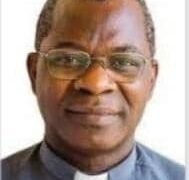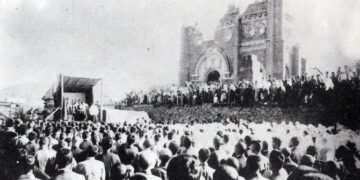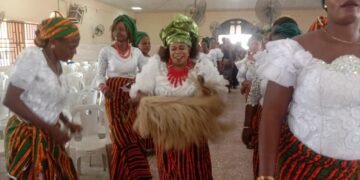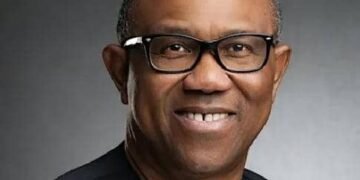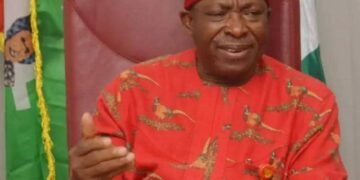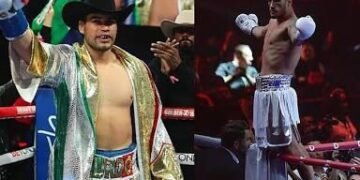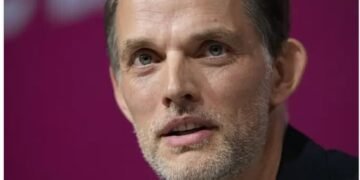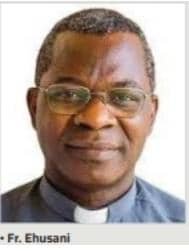By Neta Nwosu
The Executive Director, Lux Terra Leadership Foundation, Rev. Fr. George Ehusani has bemoaned the lack of leadership integrity, which he said is evident in the crop of leaders at all levels of political offices in the country. According to him, “Leadership debauchery and elite idiocy” have tendencies of ruining any nation, irrespective “of how perfect the political, structural and governance blueprint they adopt”. He made this assertion recently at the Policy Dialogue on ‘New Governance Structure for Nigeria’, organised by the Abuja School of Social and Political Thought at the Federal Capital Territory, Abuja calling for an ethical and moral revolution.
While delivering his address entitled “Leadership Debauchery and The Imperative of Revisioning, Recalibrating, Reconfiguring or Restructuring Nigeria,” Fr. Ehusani urged Nigerians to pay heed to ‘moral vacuity’ among the upper crust of the political, economic, religious and socio-cultural sectors of the country in matters that bother on reconfiguration or restructuring of the Nigerian nation, and governance structures that best suit its context of ethno-religious and cultural diversity. The cleric said, “As we engage in one more brainstorming session on the future of the Nigerian nation, I ask that we pay urgent attention to, and address very critically the embarrassment of the naked public square in Nigeria, whereby criminally minded characters, and alleged gangsters in our midst, are more easily finding their way to all levels of political office, than men and women of honour, integrity, discipline, modesty, patriotism and sacrifice.
“Yes, as we engage in one more political dialogue session, I ask that we seriously interrogate the situation whereby our nation more easily throws up for political office, crooked and devious characters, including ethnic bigots and religious extremists, those who regularly manipulate the religious sentiments of the people, those who recklessly exploit the age-old ethnic acrimonies and antipathies in the land for selfish political gain, and the thoughtless others who habitually loot the local government, state or national treasury for themselves and their families, and render the population destitute. “Until we address this anomaly, this fundamental error in our concept of political leadership and the leadership recruitment process, I do not believe that any measure of tinkering with our political structures alone will transform our fortunes.”
According to Fr. Ehusani, “The socio-economic and political fortunes of a people often hang peremptorily on the integrity or lack of integrity of its leaders. Where there is moral integrity among the ruling class, the people make economic progress and experience stability and peace. But where the leaders are illegitimate, corrupt, unjust, immoral and lacking in credibility, the people suffer economic stagnation, social discord and eventual collapse.” The Executive Director, Lux Terra Leadership Foundation called for an urgent need for re-visioning, re-configurating or restructuring of the Nigerian nation, insisting that nations are however built primarily and fundamentally on values, and not on the quality of political or structural blueprints embraced, nor the abundance of material resources, as indeed the post-independence Nigerian experiment has demonstrated. “
Nation building refers to the internal, organic and dynamic process by which a society identifies, discusses, contests, and reaches consensus on shared values, principles and norms; the process by which a society galvanises a sense of national cohesion, consolidates a national identity, and forges a sense of common purpose or a set of common goals to which the society is oriented. In other words, nation building is the process of moulding diverse groups into a unified cohesive, harmonious, and stable national entity, with shared vision and collective mission. “Essential and of critical importance in the process of nation building is a transparently honest, visionary, self-sacrificing, and therefore legitimate and credible leadership. Such leadership assumes the role of Architects, Engineers, and Project Managers of the emergent nation.
Thus, strong, stable, unified, and prosperous nations are built fundamentally on values, and experience has shown that such values are anchored on and sustained by leaders of transparent integrity and credibility, whose very lives encapsulate and personify the values that they seek to propagate in the polity. “Otherwise, such value will hardly take root in the society. When however, such critical values for nation building as leadership integrity, justice and fairness, as well as a high degree of patriotism and sacrifice for the common good, are missing, what we often have is a free-for-all: intractable conflicts, political tension and social discord, the preponderance of violent crimes, monumental corruption, and widespread impunity. “Indeed, 4th Century Philosopher, St. Augustine of Hippo declared that kingdoms (or societies) devoid of justice, are “nothing but a bunch of bandits or a gang of robbers.”
The fiery Priest enjoined government to implement the recommendations on restructuring of the country put forward by several groups from Erstwhile Military President, General Ibrahim Babangida (retd) to former President Goodluck Jonathan’s administrative era. He remarked, “Nigerians have produced tons of documents from several dialogue sessions in the last 29 years – from Babangida’s 1986 Political Bureau to Jonathan’s 2014 National Dialogue. The recommendations for structural reforms from these dialogue events have been ignored by a succession of leaders. But these previous recommendations must now be considered among the low-hanging fruits from which to start the project of salvaging our failing nation state. If Nigeria is to be saved, the changes we require to bring about are not superficial, but massive, fundamental, and far-reaching.”
Fr. Ehusani made a strong case for taking the bull by the horns in re-engineering Nigeria, especially as concerns re-evaluation of the country’s religious and cultural diversity in governance. He summarised his proposal for transformative change under three broad themes termed, ‘Rule of Law’, ‘Equal Citizenship, and ‘Self-Determination’ or what has often been described as ‘Devolution of Powers’, to reflect the true nature of the country as a federal state rather than a unitary system that is claiming to be a federation. “We must trace our steps back to the federalist route negotiated by the founding fathers and understand that the basis of the existence of Nigeria is mutual respect for the religious, ethnic and cultural diversities of all those in the union. The 1999 Constitution has vested too much power in the centre and emasculated the federating units, he said.
Continuing, the cleric stated, “There is widespread call today that we dust up the 1963 Constitution and amend it for our present-day circumstances. Part of the implications of this may be that we go back to embrace the parliamentary system; that we adopt no more than six or seven viable regions or states, and grant a good measure of self-determination to those regions, thereby reducing to the barest minimum the items on the exclusive legislative list. “We need to cut down massively on the cost of governance by merging ministries, departments and agencies, in a more radical manner than the Oronsaye report recommended twelve years ago. “We must now summon the courage to discuss openly and frankly the thorny issues of religion and state of origin, agree on what place any religion should play in governance, and resolve on whether we want to live under a monarchical theocracy of some sort, or we want to live together as a modern federal democratic, multi-ethnic and multi-religious entity, founded on the principles of justice, equity, equality and mutual respect.
If we are not able to resolve these thorny issues once and for all, I would humbly submit that we allow any geopolitical entities desiring to secede, to do so peacefully, before it is too late; for quite frankly, as presently constituted, Nigeria is not working for the majority of those who call this place home.” On a final note, Fr. Ehusani remarked that the Nigerian society is desperately in need of ethical reorientation, if we are going to have a measure of progress, going forward. “Let me conclude by saying once again that I honestly do not believe that any measure of political or structural reconfiguration can take Nigeria out of the present conundrum, as long as we as a people continue to bear such a heavy burden of ethical and moral degeneracy. “To address this situation that has bedeviled our nation, what we require is nothing short of a wholesale ethical and moral revolution.
But can the imperative of such an ethical and moral revolution be incorporated into the ongoing debate on the reconfiguration, recalibration or restructuring of the Nigerian state? I pray that many stakeholders at this and similar dialogue sessions will give the required attention to the much neglected but critical element of leadership integrity for wholesome national development, peace and prosperity.”
